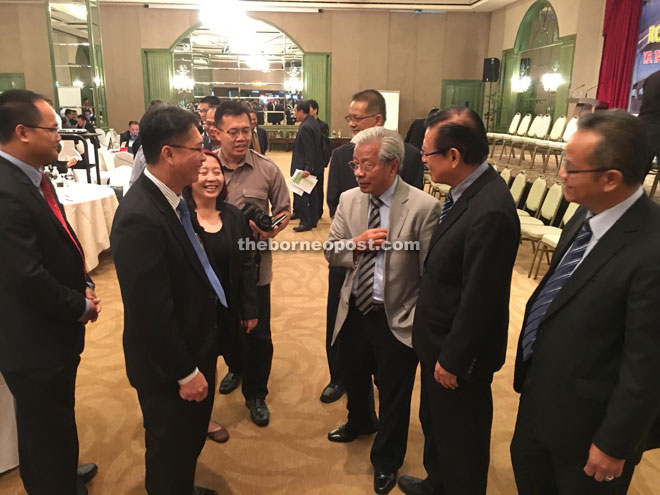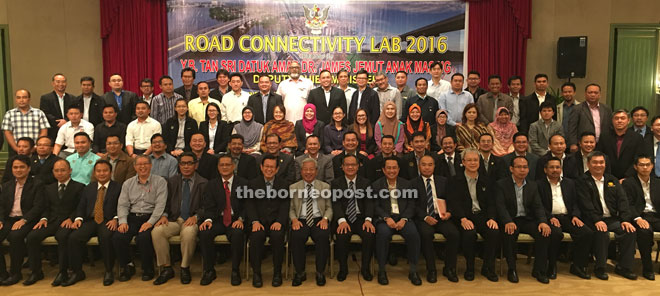
Masing speaking during a press conference after declaring open the Road Connectivity Lab 2016 yesterday. Also seen are Lee (second right) and Liwan (right).
KUCHING: A total of RM24.8 billion is needed in the next 14 years to construct 4,402 kilometres (km) of rural roads to connect over 1,000 village settlements throughout the state that are still without access.
In disclosing this, Deputy Chief Minister Tan Sri Datuk Amar Dr James Masing said this would mean that on average, some 338 km of rural roads needed to be built every year at the cost of RM1.9 billion to achieve the target by 2030.
“This is a very tall order but if we do it together, I think we can make it. If you want to see all village settlements to be connected, that will cost us RM24.8 billion,” he told reporters after officiating at the Road Connectivity Lab 2016 here yesterday.
Masing, who is also Infrastructure Development and Transportation Minister, said there was much to be done as 70 per cent of divisions such as Mukah, Kapit and Sibu were still not connected by road.
“Nonetheless, we will strive to achieve better connectivity for Sarawak and the outcome of this lab is one of the many stepping stones to plan for road infrastructure and connectivity.”
He pointed out that the target to build the rural roads to connect the village settlements could be fulfilled if the state could have RM2 billion from the Goods and Services Tax (GST) collected every year.
“Sarawak collects RM2 billion of GST per year. We need RM1.9 billion per year to build the roads in order for us to complete the road construction of 4,402 km by 2030. If we can have the RM2 billion, we will have more than enough to fulfil our dream of connecting the whole of Sarawak with roads.
“So we have the money, but does the Malaysian government have the political will to allow this to happen. Many people say GST is of ‘no use’, but if we use GST properly, we have the funds to do it (construct the roads).”
Masing, who is Baleh assemblyman, said without the additional funding from GST, the state would not have the means to build infrastructure as the income from the oil and gas royalty would not be sufficient due to their declining prices.
He said proper discussion would have to be carried out with the federal government as to whether the state could use some of the money collected from GST to improve the state’s road infrastructure and connectivity.
Responding to re-elected Ba Kelalan assemblyman Baru Bian’s statement that the RM253 million spent by the Defence Ministry to implement 11 Jiwa Murni projects in Sarawak was a waste of public funds following the ‘less than satisfactory’ quality of work revealed in the Auditor-General’s report, Masing said priority was given to create connectivity.
“To me, connectivity is very important. You connect people first, then you decide on the quality of road. Just like the Public Works Department (PWD) roads, we will improve them all the time but you must understand what we want to do first? To me it is connectivity.

Masing (seated eighth left) in a group photo with the Road Connectivity Lab 2016 participants yesterday.
“At the moment, Jiwa Murni roads will create connectivity. Although they won’t last like roads constructed by PWD, at least you can move from point A to point B.”
Citing the stretch from Belaga town to Menjawah, Belaga as an example, Masing said the cost to construct the Jiwa Murni road was RM61 million which was about four times cheaper compared to PWD’s Grade R1 (village road) road that would cost RM201 million.
“We will build connectivity first then the roads will be upgraded along the way. If we have the funds we will do it but if don’t have, we will upgrade the road by sections that are not good. My ministry and PWD will look into it very seriously. All damaged roads will be repaired as soon as we have the funding so that we can create connectivity and the roads are motorable.”
Among those present were Assistant Minister for Land and Air Transportation and Safety Datuk Lee Kim Shin, Assistant Minister for River Transportation and Safety Liwan Lagang, Infrastructure Development and Transportation Ministry permanent secretary Safri Zainudin and state PWD director Zuraimi Sabki.
